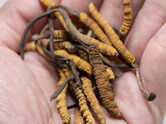01/6Steps to take amid new emerging COVID variants

Also read: How COVID is affecting heart health: Key points on complications, symptoms
02/6Two COVID variants likely to 'take over' UK


Not just that, as per the health body, along with XBB.1.5, CH.1.1 will replace the BQ.1 variant as the most dominant.
In a statement, the UKHSA said, “The analysis shows that coronavirus (COVID-19) cases in the UK are primarily made up of BQ.1 and its sublineages, consistent with the UKHSA risk assessment published in October.
“Two variants, CH.1.1 and XBB.1.5, appear to have a growth advantage in the UK.
“Both are variants in the Omicron family.
“XBB.1.5 remains at very low prevalence in the UK, so estimates of growth are highly uncertain.
“The risk assessment conducted by UKHSA together with academic partners found that CH.1.1 and XBB.1.5 are currently the variants most likely to take over from BQ.1 as the next dominant variant in the UK, unless further novel variants arise.”
Also read: Omicron XBB.1.5 variant: Top COVID symptoms seen in infections caused by the 'most transmissible variant'
03/6Vaccinated people more at risk of XBB.1.5 variant


"Omicron subvariant XBB.1.5 now accounts for 73% of all sequenced COVID-19 cases in NYC. XBB.1.5 is the most transmissible form of COVID-19 that we know of to date and may be more likely to infect people who have been vaccinated or already had COVID-19," read a tweet by the official account of the NYC Department of Health and Mental Hygiene.
However, the health experts continue to urge people to get vaccinated.
04/6How India can stay prepared


Wearing a well-fitted mask, maintaining social distance, avoiding crowds and following proper hand hygiene are some of the essential measures you can take.
Vigilance is extremely crucial, especially because the vulnerable in the society continue to be at huge risk of severe illnesses.
05/6Role of vaccination


Although breakthrough infections are still prevalent, experts continue to encourage people to take the jabs so as to reduce the risk of hospitalization and death.
"We do not know yet whether XBB.1.5 may cause more severe disease. Getting the COVID-19 vaccine — including the updated booster — is still the best way to protect yourself from hospitalization and death from COVID-19, including from these new variants," reads the tweet by the NYC Department of Health and Mental Hygiene.
06/6Know your symptoms


- Runny nose
- Headache
- Fatigue (mild or severe)
- Sneezing
- Sore throat
In case you develop these symptoms, do not make the mistake of socializing with others. Regardless of whether or not you have COVID, isolate yourself. Best to take a COVID test and wait until the results read 'negative'.
































































































closecomments
SIGN IN WITH
FacebookGoogleEmail